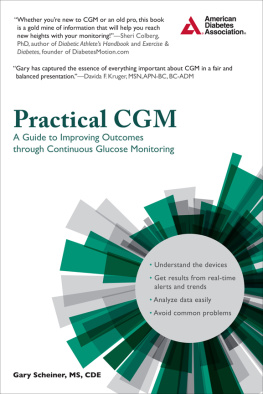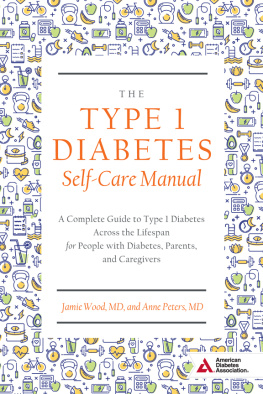UNTIL THERE IS A CURE
The Latest and Greatest in Diabetes Self-Care
Gary Scheiner, MS, CDE

Copyright 2013 Gary Scheiner, MS, CDE
All rights reserved under International and
Pan American Copyright Conventions.
No part of this book may be reproduced or transmitted in any form or by any means electronic or mechanical including photocopying, recording, or by any information storage and retrieval system, without permission in writing from the publisher.
This edition is published by
Spry Publishing LLC
2500 South State Street
Ann Arbor, MI 48104 USA
10987654321
Library of Congress Control Number: 2012955507
E-book ISBN: 978-1-938170-13-3
Disclaimer: Spry Publishing LLC does not assume responsibility for the contents or opinions expressed herein. Although every precaution is taken to ensure that information is accurate as of the date of publication, differences of opinion exist. The opinions expressed herein are those of the author and do not necessarily reflect the views of the publisher. The information contained in this book is not intended to replace professional advisement of an individuals doctor prior to beginning or changing an individuals course of treatment.
Contents
I never used to believe in that saying, The more things change, the more they stay the same. Then I entered the diabetes field.
This book is all about keeping pace with the changeschanging technology, changing therapies, changing approaches to diabetes management. Basically the information provided here will help you take advantage of whats new and improved, and ultimately make your diabetes control a little bit better and living with this chronic condition a little bit easier.
With changes taking place all around us, what exactly has stayed the same? For starters, the goal of diabetes management is roughly the same: to manage blood sugar as effectively as possible so that it does not keep us from enjoying life to the fullest. The emphasis on self-management hasnt really changed. Experts recognize that diabetes is the type of condition that involves countless choices and decisions on the part of the patient on a daily basis. To expect your doctor or nurse to be there all the time is a pipedream. We, as people with diabetes, must educate ourselves and obtain and use the necessary tools to manage effectively.
One other constant through the years is hope. We all hope that doing the right things will produce the desired results. We also hope for a cure. Back in 1985 when I was diagnosed with type 1 diabetes in a Texas town called Sugarland (Gods honest truth!), my endocrinologist tried to convince me how lucky I was to be diagnosed when I was.
Weve come a long way in recent years, he said. The way research is going, in 5 or 10 years, your diabetes will probably be cured.
That was more than 25 years ago. Still no cure, but people are still saying, In 5 or 10 years well have a cure. Although there is some very promising research taking place, Im not one to put my eggs in that basket. My personal goal, and what I emphasize to my patients, is to take the best possible care of their diabetes here and now. When a cure does finally come alongand it willI want to be in the best of health and have no regrets about the effort I put in.
Today, I can look back at the way diabetes was treated when I was diagnosed and say, Man, those were the Stone Ages! But you know what? Five or ten years from now, Ill probably look back to today and think the very same thing. At least I hope so.
WHY MANAGE?
Whether youve had diabetes for a month or a millennium, you know that managing it takes work. There are sacrifices to be made, expenses involved, and mental and physical energy that youd probably rather use on something a bit more fun. If youre going to put the work in, you deserve to get something for it. Heres a quick overview of what you stand to gain.
Immediate Benefits
Increased Energy Elevated blood glucose reduces energy levels. Fuel that should be available to your muscles is floating around in the bloodstream instead. This tends to cause sleepiness and sluggishness. As soon as glucose levels return to normal, energy levels usually improve.
More Restful Sleep The quality of sleep is affected by poor glucose control. If your glucose is high enough, you might wake up several times during the night to run to the bathroom. Low glucose will probably wake you as well. Most people with diabetes report feeling better rested when glucose levels are well controlled through the night.
Improved Physical Performance Glucose control has an immediate effect on your physical abilities. Elevated glucose can reduce your strength, flexibility, speed, stamina, and endurance. Low sugar levels impair coordination and muscle function. When glucose levels are near normal, your energy and physical performance can be maximized.
Appetite Reduction Ever feel like there is no end to your hunger? High glucose may be to blame. If not enough sugar is getting into your bodys cells, hunger is going to increase. Controlling glucose levels is a good way to keep your appetite in check.
Brain Power High and low glucose limits our ability to focus, remember, perform complex tasks, and be creative. Wide variations in blood sugar levels, such as rises and falls that occur after meals, have also been shown to hinder intellectual function. Improving your glucose control will make it easier for your brain to operate at its best. There is also evidence that people with uncontrolled diabetes have a higher incidence of Alzheimers disease.
Stable Moods/Emotions The brain is also responsible for maintaining our emotional balance. Moods often change along with our blood sugars. High glucose levels can make us impatient, irritable, and generally negative. Achieving near-normal blood sugars and keeping them there can go a long way toward improving your mood and emotional stability.
Fewer Sick Days Infection-causing bacteria and viruses thrive on glucose. When sugar levels are up, we become virtual breeding grounds for infection. Everything from common colds and sinus infections to flu and vaginal yeast infections are less common when blood sugars are well controlled.
Healthier Skin and Gums Both the skin and gums are affected quickly by elevated glucose levels. Since skin is influenced by our level of hydration, when blood sugars are high, skin tends to become dry and cracked. And bacteria that live below the gum line grow quickly when exposed to high sugar levels in our blood vessels. These bacteria then form plaque at an accelerated rate, contributing to bleeding gums and loose teeth. Controlling your diabetes will help cut back on plaque buildup immediately.
Personal Safety If you drive a car, operate power equipment, play a sport, or just walk across the street, uncontrolled blood sugar can put you at risk. High glucose can cause sleepiness and slow reaction times (a recipe for disaster when driving). And the opposite extreme, hypoglycemia (low blood sugar) will always cause some degree of mental impairment. Decision-making and judgment will be off. Coordination suffers and trembling can occur. To keep yourself and those around you safe, blood sugar must be managed properly.
Predictable Periods Women with near-normal HbA1c levels (a measurement of average glucose levels over several months) tend to have more regular menstrual cycles than women with an elevated A1c. Blood glucose levels that are maintained at near-normal levels will minimize some of the negative symptoms associated with the menstrual cycle.













